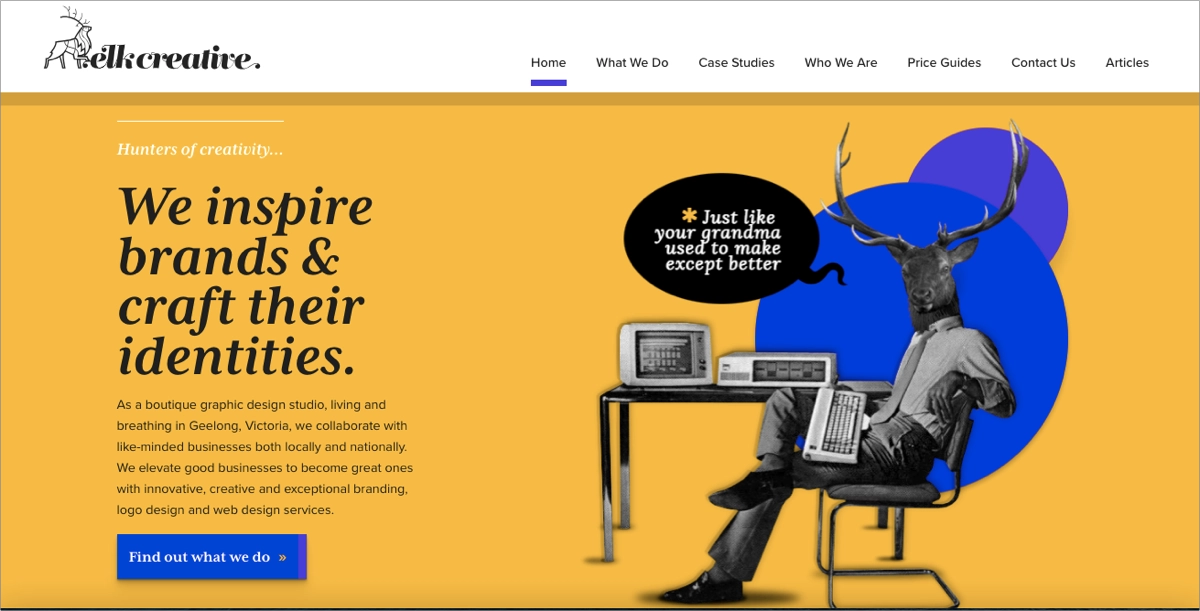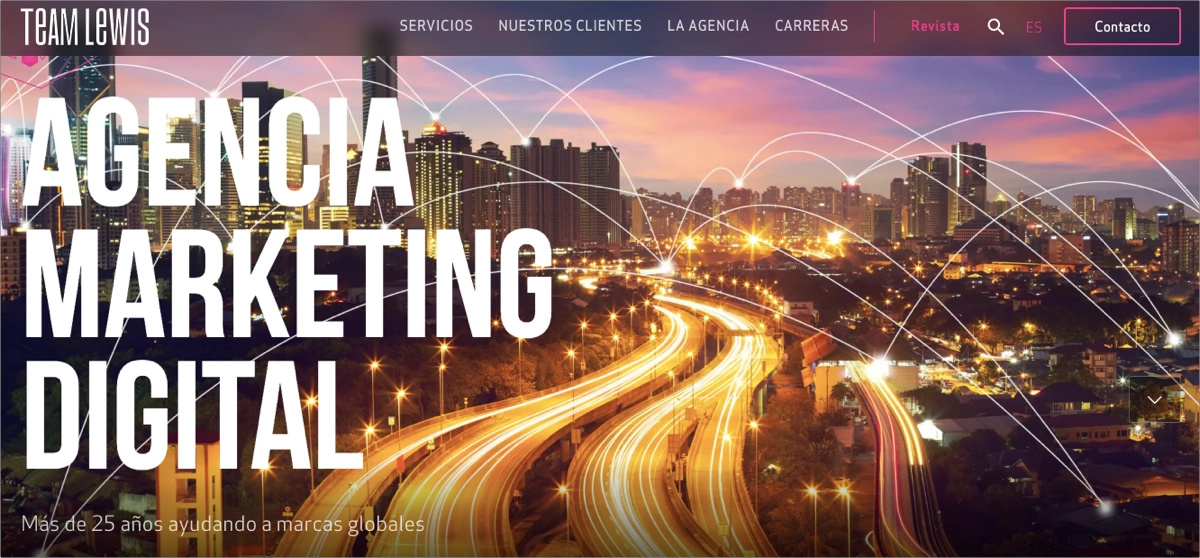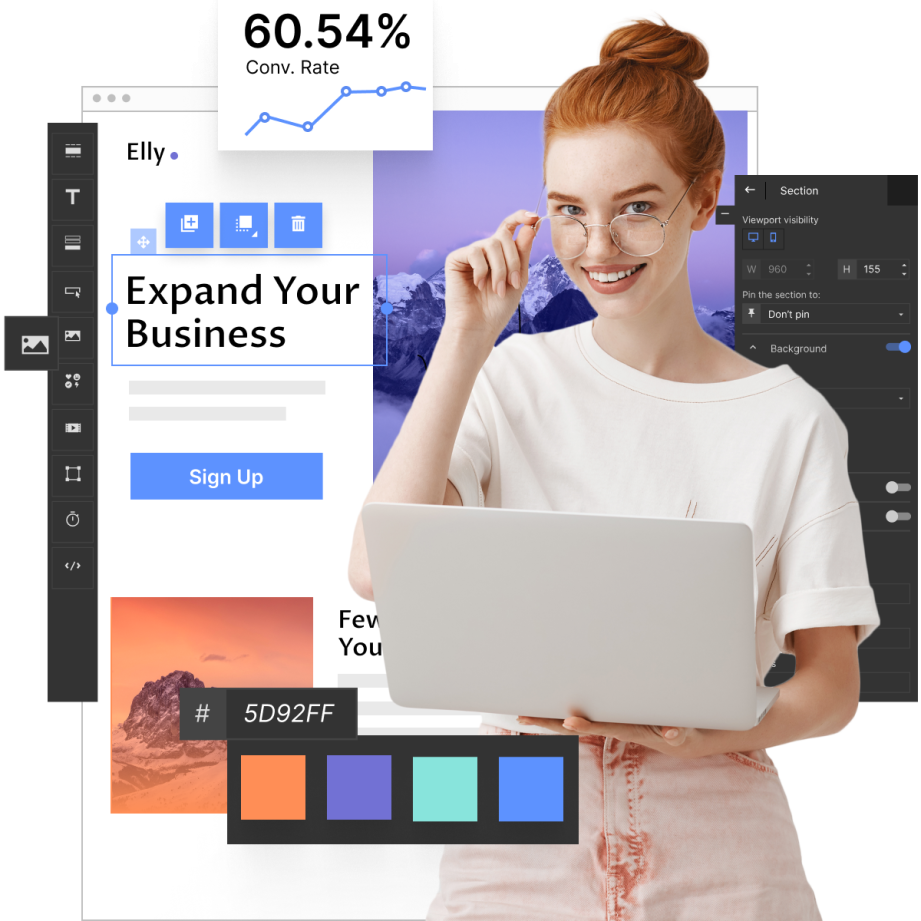A digital marketing agency website is both a portfolio and a lead generation tool. It showcases services, expertise, and creative work – building trust and attracting clients.
But getting it right isn’t easy. According to Forbes, 61% of users leave a site if they can’t find what they need within 5 seconds. That’s why top-performing agency websites focus on clarity, smart design, and strong messaging from the first click.
The best sites don’t just describe services – they use strategic landing pages, interactive elements, and clear calls to action to guide users and drive conversions.
In this article, you’ll see examples of agency websites that get it right. From sleek layouts to high-converting landing pages, these designs offer practical inspiration to help you build or improve your own site.

What Is a Digital Marketing Agency Website?
A digital marketing agency website is a platform that showcases the agency’s services, expertise, and achievements. It helps potential clients understand what the agency offers and demonstrates its experience in digital marketing.
The site highlights services like SEO, social media marketing, content creation, PPC advertising, and web design. It acts as both a portfolio and a lead generation tool, helping visitors see how the agency can meet their needs.
An effective website presents the agency’s approach, results, and case studies. It may feature a section with past projects, client reviews, and certifications to build trust. Common resources include blog posts about marketing trends, white papers on strategy, and e-books with tips for growing online presence.
The site is designed to drive action. Calls to action lead to contact forms, consultation bookings, or newsletter sign-ups. This helps convert visitors into leads and strengthens the agency’s position in a competitive market.
What Is the Purpose of a Digital Marketing Agency Website?
A digital marketing agency’s website is designed to attract, inform, and convert potential clients. It promotes services, highlights the agency’s expertise, and offers a clear value to visitors. The goal is to prompt action – such as scheduling a consultation.
As part of the agency’s overall digital strategy, the website builds credibility and shows the team’s skills in areas like SEO, content marketing, and paid advertising. A well-structured site quickly shows how the agency can meet a client’s marketing goals.
Lead generation is another key purpose. With clear calls to action, the site encourages visitors to request consultations, sign up for newsletters, or download resources. The layout guides users from first interest to active engagement, helping convert them into leads and long-term clients.
The website also serves as a knowledge hub. It often features blogs on marketing trends, downloadable e-books, and insights into industry shifts. These elements help position the agency as a thought leader and give visitors reasons to return.
How Landing Pages Help Digital Marketing Agencies Convert Visitors into Clients?
A well-crafted landing page focuses a visitor’s attention on a single offer, guiding them from curiosity to action without distractions. By combining persuasive copy, targeted visuals, and clear calls-to-action, agencies can turn ad clicks and organic traffic into qualified leads.
Features like testimonials, case studies, and data-driven proof points build trust, while A/B testing and analytics ensure the page continuously improves. For agencies managing multiple campaigns, strong landing page execution can directly increase client acquisition rates and prove measurable ROI.
How to Define a Good Digital Marketing Agency Website?
A good agency website has a clear structure, strong design, relevant content, and smooth functionality. These features create a positive user experience, build trust, and support three main goals: showing expertise, engaging users, and converting leads.
A strong layout helps visitors quickly find information about services and the agency’s approach. The design should be engaging, with high-quality visuals, intuitive navigation, and clear CTA buttons. These elements guide visitors to take actions like scheduling a consultation or downloading a resource.
Effective websites also show expertise by offering content such as blog posts, industry insights, and case studies. This keeps users informed and encourages return visits.
Finally, functionality matters. Mobile optimization, fast loading times, and error-free performance ensure a smooth experience on any device.
How to Create a High-Performing Digital Marketing Agency Website?
To build a high-performing agency website, focus on user-friendly design, clear messaging, strong CTAs, and content that shows your expertise. Start by defining your main goals – such as generating leads or sharing marketing insights. Clear objectives shape the site’s structure, content, and design.
Begin with audience research. Identify the needs and preferences of your target clients. This helps you create content that matches their search intent and interests.
Once your goals and audience are clear, start building the website. Follow the key steps below to ensure it attracts, engages, and converts visitors.
#1 Focus on User-Centric Design
Create a layout that is both functional and visually appealing. A positive user experience depends on clean design, simple navigation, and fast performance. Use responsive design so the site works well on mobile and desktop. Make information easy to find and navigation intuitive.
#2 Showcase Your Expertise
Use case studies and client testimonials to prove your agency’s results. Highlight successful projects that show how you solve real client problems. These elements build trust and act as social proof that your agency delivers on its promises.
#3 Provide Valuable Content
Offer content that answers real questions and adds value – such as blog posts, guides, or e-books. Focus on topics your audience cares about. High-quality content positions your agency as a trusted expert and keeps visitors coming back.
#4 Include Strong CTAs and Contact Options
Use clear calls to action that guide users to take the next step – such as booking a consultation, subscribing to a newsletter, or downloading a resource. Place CTAs throughout the site to increase engagement. Keep contact forms simple by asking only for essential info like name and email. Offer multiple contact options, including chat, email, and phone, to make it easy for visitors to reach you.
#5 Optimize for SEO
Optimize your site for search engines to attract more organic traffic. Use keywords, meta descriptions, and alt text for images to improve visibility. Strong SEO helps potential clients find your agency when they search for digital marketing services.
Once your website is live, keep testing and improving it. Use analytics tools to track performance and understand visitor behavior. Run A/B tests on CTAs, landing pages, and layouts to boost conversions and maintain strong results over time.
4 Digital Marketing Agency Website Best Practices
To build an effective digital marketing agency website, focus on four key practices: a clear value proposition, engaging content, mobile responsiveness, and trust-building. These strategies help attract visitors, keep them engaged, and convert them into clients.
1. Set Up a Clear Value Proposition
Your homepage should quickly explain what makes your agency different. A strong value proposition tells visitors how you solve their problems better than competitors.
Use a clear, direct headline in the hero section. Make it specific, relevant, and compelling. This is your first chance to grab attention – use it to show value, not just make an impression.
2. Be Creative
Good structure and functionality matter, but creativity sets your website apart. To stand out, your agency site must go beyond a standard layout.
Use bold design choices, strong visuals, and engaging storytelling. Try custom layouts, unique typography, animations, or video. Use charts or graphics to present data clearly. Share your agency’s mission in a way that connects emotionally with visitors.
Creative design helps show your agency’s personality, making it more memorable and competitive.
3. Prioritize Mobile Responsiveness
According to Exploding Topics, 92.3% of internet users browse, search, and shop on smartphones. Your website must work flawlessly on mobile to meet this demand.
Ensure fast loading times and responsive design across all devices. A mobile-friendly site improves user experience, reduces bounce rates, and supports better SEO. It also expands your reach and increases your chances of converting visitors into clients.
4. Build Trust
Trust is essential for converting visitors into clients. Use your website to prove your agency’s credibility.
Showcase client testimonials, case studies, and certifications. Highlight awards, industry partnerships, and measurable results. Add client logos and data-driven charts to back up your claims. Social proof helps new visitors feel confident in choosing your agency.
5 Successful Digital Marketing Agency Website Examples
Here are five agency websites that apply best practices to attract, engage, and convert visitors. These sites rank well in search results, meet audience needs, and turn traffic into leads.
Each example features a clear layout, intuitive navigation, and strategic use of content, visuals, and social proof. Use them as models for structuring your own high-performing agency website.
1. Akeo
Akeo’s website blends bold design with a wide range of services, including branding, UX design, web development, and VR/AR solutions. Each service is clearly described with unique terms like “empathic branding” and “immersive VR,” showing the agency’s tailored approach.
The site uses a user-centric, visually striking layout that grabs attention with animations and interactive elements. Its modern design reflects Akeo’s brand identity while building credibility.

Clear sections, strong CTAs, and visible contact options guide visitors smoothly through the site. Testimonials and portfolio pieces add social proof, making this a strong example of a lead-generating, high-performing agency website.
2. Elk Creative
Elk Creative’s website positions the agency as a modern, results-driven partner. The homepage opens with a bold headline and clear value proposition, showing how the team turns client ideas into innovative digital products.
The site features clean design, smooth navigation, and interactive elements that guide users to key pages, including detailed pricing guides. Case studies, testimonials, and project highlights build trust and showcase proven results.

Strong CTAs and clear service descriptions make it easy for visitors to take the next step. Elk Creative’s site balances design with strategy, offering a client-focused experience that drives engagement and conversions.
3. Agencia TEAM LEWIS
TEAM LEWIS offers a broad range of services – from SEO and content marketing to paid ads and web design. Their website reflects this scope with a clear, well-organized layout that helps users quickly find relevant information.
Each service is described with a focus on tailored solutions and alignment with client goals. The site features a modern, interactive design with smooth navigation and engaging visuals, creating a strong user experience.

TEAM LEWIS highlights its global presence, reinforcing credibility through international reach and local adaptability. Case studies, testimonials, and clear CTAs support conversion by showing real results and inviting engagement.
This website combines strong content, professional visuals, and user-focused functionality – making it a powerful example of a well-executed agency platform.
4. ASTUDIO
ASTUDIO’s website presents a polished, professional platform that appeals to global brands. It clearly outlines services, includes strong CTAs, and builds trust through strategic messaging and design.
The site combines sleek visuals with user-friendly functionality. High-quality images, responsive layouts, and smooth navigation ensure a seamless experience on all devices. Case studies and detailed service pages highlight past successes and reinforce the agency’s expertise.

ASTUDIO’s site balances design with substance, positioning the agency as a leader in innovative digital marketing while driving engagement and conversions.
5. WebMechanix
WebMechanix’s website combines modern design with clear, results-focused messaging. It highlights a wide range of services and guides users toward conversion with a smart, 3-step contact form that begins with an action-oriented question.
Engaging visuals and interactive features enhance the user experience while maintaining intuitive navigation. Case studies, testimonials, and strong CTAs build credibility and encourage inquiries.

The site effectively balances design, content, and lead generation – making it a strong example of what a high-performing digital marketing agency website should look like.
What Is the Best Website for a Digital Marketing Agency?
The best digital marketing agency websites combine strong visuals, smooth functionality, and strategic content to attract and convert visitors. They have a clear structure that guides users through service pages, builds trust, and prompts action.
An effective homepage features a clear value proposition, high-quality visuals, and intuitive navigation. It stands out from competitors and directs users to detailed service pages, case studies, and contact options.
Content plays a key role. Case studies, testimonials, and industry insights help establish expertise and credibility. Clear, well-placed CTAs invite visitors to book consultations or sign up for newsletters.
Mobile responsiveness, fast load times, and SEO optimization ensure the site is accessible and visible in search results. A top-performing agency website leaves a strong impression, builds trust, and supports business growth.
What Is the Best Landing Page Builder for Digital Marketing Agency Websites?
Landingi is one of the best landing page builders for digital marketing agencies. It offers a drag-and-drop editor that makes it easy to create, publish, and optimize pages without coding. The platform supports mobile-friendly, pixel-perfect designs – ideal for running high-performing PPC campaigns and maintaining brand consistency.

Landing pages are essential in shaping an agency’s site by capturing visitor attention, driving conversions, and showcasing services. With customizable templates and integrated A/B testing features, Landingi empowers agencies to adapt pages for maximum engagement. The platform provides a professional analytics tool, EventTracker, which allows you to monitor events and user interactions on your pages effortlessly. The information gathered enables data-driven conversion optimization, helping to improve overall performance.
Thanks to Landingi, your agency can easily reach global audiences by leveraging multi-language pages. The platform supports translation into over 35 languages, allowing for automated translation of your landing pages in minutes. With AI landing page features, you can craft attractive content, optimize pages for SEO, and improve their visual appearance, strengthening your brand’s identity. Additionally, Landingi offers over 170 integrations, including marketing tools and CRM systems, so it can connect to your existing digital marketing toolkit and streamline your workflow. These capabilities make it a perfect fit for crafting specialized, conversion-focused pages that elevate an agency’s digital strategy.
Where Can I Find the Best Website Templates for Digital Marketing Agencies?
You can find high-quality website templates for digital marketing agencies on platforms like Wix and Webflow.
Wix offers stylish, customizable templates that don’t require coding. Its templates are tailored for agencies and allow for quick setup with a professional look.
Webflow provides advanced, feature-rich templates ideal for agencies that need full design flexibility. Templates are easy to customize and can be adapted to fit any brand or marketing strategy.
Both platforms offer strong starting points for building a functional, visually appealing agency website.
What Are the Current Trends in Digital Marketing Agency Websites?
Modern digital marketing agency websites focus on user experience, clear messaging, and interactive design.
Minimalist layouts with bold typography and strategic white space help users find information quickly. Clean, user-centric designs reduce clutter and improve navigation.
To boost engagement, agencies use interactive elements like scrolling effects, animated icons, and clickable case studies. Video backgrounds and explainer videos remain popular for presenting services in a compelling way.
Personalization is on the rise, with some sites using AI-driven features to deliver tailored content. Mobile optimization is essential, ensuring fast, responsive experiences across smartphones and tablets.
These trends help agencies create websites that are engaging, functional, and conversion-focused.
What Are the Limitations of Digital Marketing Agency Website
While digital marketing agency websites are valuable tools for attracting and converting clients, they come with key limitations, including timely content updates, differentiation in a crowded market, SEO challenges, and technical limitations.
1. Outdated Content
Keeping content fresh is a challenge. Without regular updates, the site can lose relevance and credibility.
2. Lack of Differentiation
In a crowded market, many agencies offer similar services. Standing out requires custom content, strong branding, and creative design – all of which demand time and resources.
3. SEO Maintenance
Ranking well in search engines requires ongoing optimization, regular keyword updates, and technical SEO work. This can be complex and time-consuming.
4. Performance vs. Design
Heavy visuals, videos, or animations may hurt site speed, negatively affecting both user experience and search rankings.
5. Technical Constraints
Maintaining mobile responsiveness, integrating new features, and ensuring consistent performance can be resource-intensive, especially for smaller agencies without dedicated technical teams.
Overcoming these challenges requires continuous investment in technology, UX design, and strategic planning.
Power Your Agency Website with Landing Pages That Convert
Top-performing digital marketing agency websites use landing pages to drive conversions, support PPC campaigns, and increase user engagement. These pages are focused, action-oriented, and designed to turn visitors into leads.
Well-designed landing pages improve the user experience and highlight specific services, promotions, or campaigns. They also help reinforce brand authority and improve overall site performance.
Using a landing page builder like Landingi allows agencies to create and optimize pages quickly – without coding. Incorporating targeted landing pages into your site strategy can significantly boost conversion rates and campaign results. Try now!






